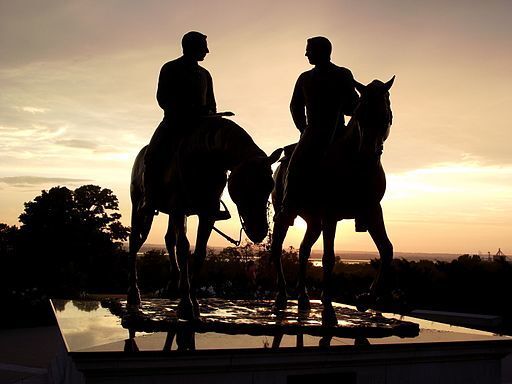Most members of the Church are familiar with the events surrounding the death of the Prophet Joseph Smith and his brother Hyrum, but what they might not realize is that news of their murder made headlines all across the country, from Arkansas and Connecticut to Florida and Maine. And though many didn't believe Joseph was a prophet, the majority of these media sources condemned the act as murder and a scandal.
As we remember the anniversary of this tragic moment in Latter-day Saint history, here's a look at a few of the reactions of newspapers across the country:
The New York Sun reported, "It is no small thing, in the blaze of this nineteenth century, to give to men a new revelation, found a new religion, establish new forms of worship, to build a city, with new laws, institutions, and orders of architecture, to establish ecclesiastic, civil and military jurisdiction, found colleges, send out missionaries, and make proselytes in two hemispheres: yet all this has been done by Joe Smith, and that against every sort of opposition, ridicule and persecution."
The New York Weekly Herald added, "Thus died the plowboy Prophet of America at the hands of an assassin, the object of intense, local persecution within Hancock County, where feeling ran high in the communities of Carthage and Warsaw against Nauvoo, its balance of power and the Prophet. Yet, out beyond the vineyards of Hancock County, beyond that beautiful bend in the Mississippi, he was a respected and an admired Prophet and statesman."
An article in the Herald of Freedom in Concord, New Hampshire stated, “. . . but I do not put the slightest confidence in the stories told of him by our political and religious presses. They tell as bad stories of the abolitionists as they do of Smith. They are not entitled to any credit. . . As to the Mormons, I would say here, that though I know nothing of their religion, or character, I venture to guess they are both better—or at least as good, as those of the ruffians who killed them—or the other ruffians who virtually back them up in it” (pg 697).
There were several other papers, including, of course, the Church-run Times and Seasons and the Nauvoo Neighbor, who also put Joseph Smith in a more favorable light. In talking about the funeral procession, the Times and Seasons reported “It was a vast assemblage of some 8 or 10,000 persons, and with one united voice resolved to trust the law for a remedy of such a high-handed assassination, and when that failed, to call upon God to avenge us of our wrongs! Oh widows and orphans! Oh Americans, weep, for the glory of freedom has departed!”
A piece printed in the Daily Evening Transcript in Boston, Massachusetts, seemed to reinforce a prophecy given to Joseph Smith by the angel Moroni that his name would be shared for good or for evil around the world:
Joe Smith is dead and gone. He was one of the most remarkable men of the age. The time for writing his history has not arrived. Men who have known him long and well, differ in their estimate of his character; the future historian alone can reconcile the contradictory statements of his friends and enemies, and place him in his true position. The personal manners of every man make him friends or enemies, regardless of his principles and of his conduct. This remark is clearly illustrated in the case of Smith. He was a man of rough exterior and course manners, thousands who approached him were so completely disgusted at once by his manners, that they refused to look at the good he claimed to have done. But notwithstanding this he was a remarkable man, and has left the impress of his genius upon the age in which he lived; he has carved out for himself a title to a page in the history of his country, and his name will be remembered, for good or for evil, when the names of half the ephemeral Statesmen of the age will be forgotten. . . He was a man of genuine courage, and would have fought to the last moment of his life. He was pursued by a band of three hundred infuriated demons, and cruelly shot down like a wild beast, while confined in a small room where he could not escape. It was a glorious exit for him. Whatever there was of evil in his heart will be forgotten in the recollection of his death. He will be eulogized by his disciples, and worshiped as a God. Time and distance will embellish his life with new and rare virtues, and more than earthly power; his doctrines will flourish, his influence will extend to ages yet unborn, and future generations will celebrate his birth and death by public festivals, public prayers, and an unlimited devotion [signed] H. J. (pg. 668-671, emphasis added).
The news even spread in Europe. The Portland Transcript in Maine shared part of a story printed in the Liverpool Mercury: “The scenes which have taken place in Pennsylvania and Illinois would have disgraced a nation of savages. We question whether. . . any record can be found more sanguinary than the riots at Philadelphia, or the massacre of the Mormon leader and his brother, in the prison at Carthage” (pg. 661).
On the other extreme, some papers, such as the Jonesborough Whig, thoroughly supported the actions of the mob, praising the murders as a victory: "Some of the public Journals of the country, we are sorry to see, regret the death of that blasphemous wretch Joe Smith, the Mormon Prophet. Our deliberate judgement is, that he ought to have been dead ten years ago, and that those who at length have deprived him of his life, have done the cause of God, and of the country, good service."
Reverend Brownlow did not hide his enthusiasm when he concluded, "Smith was killed, as he should have been. THREE CHEERS to the brave company who shot him to pieces!"
The New York Herald even went so far as to say that "The death of the modern mahomet will seal the fate of Mormonism. They cannot get another Joe Smith. The holy city must tumble into ruins, and the 'latter-day saints' have indeed come to the latter day." Others also spoke out against Joseph, calling his death the end of the “great deceiver, who has no doubt, seduced and ensnared numbers to their ruin” and claiming he would be remembered for his “deeds of darkness.”
Still others took a middle ground, denying Joseph’s standing as a prophet, but speaking out against his death in defense of a fair trial: “It will probably never be known who shot Joseph and Hyrum Smith—but their murder was a cold-blooded cowardly act, which will consign the perpetrators if discovered to merited infamy and disgrace. They have broken the pledges to the Government—disgraced themselves and the State to which they belong. They have crimsoned their perfidy with blood. . . It will long be regretted that things have taken the turn they have in relation to the Mormons” (Quincy Herald).
The Lee County Democrat in Fort Madison, Iowa, added, "The murder of Jo Smith and his Brother has caused feelings of deep regret in the breasts of every peaceable and law-abiding people; they look upon it as a high-handed outrage, and as a cruel, cold-blooded, cowardly and contemptible murder. That Jo and his brother were guilty of acts which required the interposition of the law, we are well aware, but after he and his brother had voluntarily surrendered themselves up to justice, under the full assurance that they would receive the protection of Governor Ford from all violence; they were entitled to all protection against all danger and all enemies" (pg. 659).
Though these are just a few of dozens of comments made about the death of the Prophet and his brother Hyrum, they show the wide range of influence the gospel of Jesus Christ, as restored by Joseph Smith, had and continues to have in the world. Despite the Church's small numbers and the fact that most people did not believe that Joseph Smith was a prophet, many people knew who the Latter-day Saints were, and believed that the deaths of Joseph and Hyrum Smith were unjust.
Ultimately, the description Latter-day Saints will remember best is now recorded in our scriptures, penned by Elder John Taylor in D&C section 135 verse 3:
Joseph Smith, the Prophet and Seer of the Lord, has done more, save Jesus only, for the salvation of men in this world, than any other man that ever lived in it. In the short space of twenty years, he has brought forth the Book of Mormon, which he translated by the gift and power of God, and has been the means of publishing it on two continents; has sent the fulness of the everlasting gospel, which it contained, to the four quarters of the earth; has brought forth the revelations and commandments which compose this book of Doctrine and Covenants, and many other wise documents and instructions for the benefit of the children of men; gathered many thousands of the Latter-day Saints, founded a great city, and left a fame and name that cannot be slain. He lived great, and he died great in the eyes of God and his people; and like most of the Lord’s anointed in ancient times, has sealed his mission and his works with his own blood; and so has his brother Hyrum.
Editor's note: This story originally ran on LDS Living in 2017.


